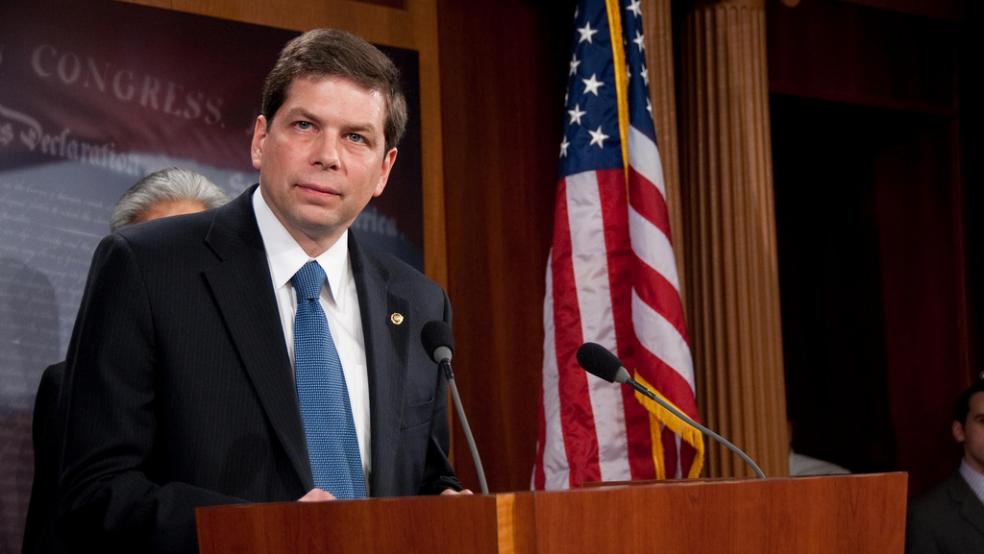If there was any doubt that the mood of Democrats on Capitol Hill has changed in recent years, Alaska Sen. Mark Begich dispelled it yesterday with the introduction of a bill that would expand Social Security benefits.
Democrats, so beaten down by concern about the budget deficit and the national debt have spent much of the last decade back on their heels when it came to the issue of Social Security. The idea of doing anything with entitlements except reducing them has been anathema for so long that it has carried over into discussions about the retirement program, even though it is actually funded by a dedicated revenue source and doesn’t affect the deficit.
The Democrats even elected a president so willing to cut entitlement spending that he backed an adjustment to the way cost of living increases are determined, which would have led to a reduction in the growth rate of the Social Security benefit.
So until recently, it would have been unthinkable for a Democrat in a tight reelection campaign – as Begich is – to propose anything beyond preserving the status quo on Social Security. But an increasingly populist tone, particularly in the U.S. Senate, with the rise of voices such as Sens. Elizabeth Warren (D-MA) and Sherrod Brown (D-OH), has meant that when a Democrat decides to push the progressive envelope, he or she won’t suddenly find all their colleagues deserting them.
Related: Liberal Dems New Goal—Boost Social Security Benefits
Indeed, when Begich took the floor Tuesday to introduce the Retirement and Income Security Enhancements (RAISE) Act, he did it not just with the blessing of Senate leadership, but with the active support of Sen. Patty Murray of Washington, a member of the Democratic leadership.
Murray co-sponsored the bill, which not only proposes to increase benefits for some Social Security recipients, but would raise taxes to fund it.
Related: The New Retirement – Meaningful Work, Thoughtful Living
In remarks prepared for delivery on the Senate floor Tuesday, Begich said that the program has served retirees well over the past 75 years, “But times change, and we need to make sure the promise of Social Security continues in a meaningful way.”
The RAISE Act, as proposed, would make it easier for divorced spouses to collect social security payments after the death of a former spouse. Currently, benefits are only available if the marriage lasted ten years. Under the bill, eligibility would begin at a 50 percent discount for those married five years, and would increase by 10 percent for every year of marriage up to ten years.
The RAISE Act would also change the way survivors benefits are calculated for couples in which both spouses worked, increasing the benefits for some currently receiving smaller benefits.
Finally, the bill would change the way the children of retired, disabled or deceased workers are treated. Instead of kicking them off benefits when they reach 19 years of age, the program would provide extended benefits for recipients who remain in college or vocational school, up to age 23.
Related: Rubio’s Retirement Savings Solution – Work Longer
Begich called the proposal, “a common sense bill to update, enhance, and protect Social Security in a fiscally responsible way.”
He continued, “When it comes to fairness, this bill is a small but important step for seniors, for older women and for the families of deceased or disabled workers. It makes sure that the modest benefits of Social Security will go to everyone who deserves them.”
In her prepared remarks, Murray said, “At a time when Social Security is an increasingly critical source of support for so many, the RAISE Act would make some commonsense updates to ensure our Social Security system is doing everything possible to help seniors and their families.”
The bill would pay for the increased benefits – and shore up the Social Security Trust Fund, which is on track toward insolvency – by adding a two percent payroll tax on earnings above a certain threshold. The tax would apply to earnings above $400,000 in 2015, and would be indexed to rise with inflation each year in the future.
It was an easy decision for me, since my commitment to bolstering Social Security started from day one in the Senate.
Top Reads from The Fiscal Times





